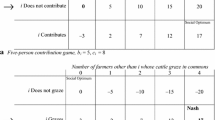Abstract
We argue that conceptual analyses of collective action should be informed by game-theoretic analyses of collective action. In particular, we argue that Ariel Rubenstein’s so-called ‘Electronic Mail Game’ provides a useful model of collective action, and of the formation of collective intentions.
Similar content being viewed by others
References
Aumann Robert J. (1999) ‘Interactive epistemology I: Knowledge’. International Journal of Game Theory 28:263–300
Aumann Robert J. (1999) ‘Interactive epistemology II: Probability’. International Journal of Game Theory 28:301–314
Binmore, Ken,Playing Fair, MIT Press, Cambridge, Massachusetts, 1994.
Binmore, Ken, and Larry Samuelson, ‘Coordinated action in the electronic mail game’, Games and Economic Behavior35:6–30, 2001.
Bratman Michael E. (1992). ‘Shared cooperative activity’. The Philosophical Review 101 (2):327–341
Bratman Michael E. (1993).‘Shared intention’. Ethics 104:97–113
Camerer, Colin, Behavioral Game Theory: Experiments in Strategic Interaction, Princeton University Press, 2003.
Chant, Sara Rachel, ‘The special composition question in action, Pacific Philosophical Quarterly, forthcoming.
Chant, Sara Rachel, and Zachary Ernst, ‘Group intentions as equilibria’, Philosophical Studies, forthcoming.
Davidson Donald (1980) Essays on Actions and Events. Clarendon Press, Oxford
Feinberg, Joel, ‘Collective responsibility’, in Larry May and Stacey Hoffman (eds.), Collective Responsibility: Five Decades of Debate in Theoretical and Applied Ethics, Rowman and Littlefield Publishers, Inc., 1991, pp. 53–76, .
Gilbert, Margaret, On Social Facts, Routledge, London, 1989.
Gilbert Margaret (1990). ‘Walking together: a paradigmatic social phenomenon’. Midwest Studies in Philosophy 15:1–14
Gilbert, Margaret, Living Together: Rationality, Sociality, and Obligation, Rowman & Littlefield, Lanham, Maryland, 1996.
David Lewis (1969) Convention: A Philosophical Study. Harvard University Press, Cambridge
Miller Seumas (2001) Social Action: A Teleological Account. Cambridge University Press, Cambridge
Rubinstein Ariel (1989)‘The electronic mail game: Strategic behavior under “Almost common knowledge”’. American Economic Review 79:385–391
Searle, John, ‘Collective intentions and actions, in Philip R. Cohen and Jerry Morgan (eds.), Intentions in Communication, MIT Press, 1990, pp. 401–416.
Searle John (1995). The Construction of Social Reality. The Free Press, New York
Skyrms, Brian, The Stag Hunt and the Evolution of Social Structure, Cambridge University Press, Cambridge, 2004.
Smith, J. Maynard, ‘The theory of games and the evolution of animal conflict’. Journal of Theoretical Biology47:209–221,1974.
Smith, Maynard J., Price G.R. (1973). ‘The logic of animal conflict’. Nature 246:15–18
Tuomela, Raimo, A Theory of Social Action, D. Reidel Publishing Company, Dordrecht, 1984.
Tuomela Raimo (1989) ‘Actions by collectives’. Philosophical Perspectives 3:471–496
Tuomela Raimo (1991). ‘We will do it: an analysis of group-intentions’. Philosophy and Phenomenological Research 51 (2):249–277
Tuomela, Raimo, The Importance of Us: A Philosophical Study of Basic Social Notions, Stanford University Press, Stanford, California, 1995.
Tuomela, Raimo, The Philosophy of Social Practices: A Collective Acceptance View, Cambridge University Press, Cambridge, 2002.
Tuomela, Raimo, ‘Joint action’, Workshop on Holistic Epistemology and Theory of Action, 2004.
Tuomela Raimo (2005). ‘We-intentions revisited’. Philosophical Studies 125:327–369
Tuomela Raimo, Kaarlo Miller (1988). ‘We-intentions’. Philosophical Studies 53:367–390
van Fraassen, Bas, ‘The pragmatic theory of explanation’, in Joseph Pitt (ed.),Theories of Explanation, Oxford University Press, 1988, pp. 136–155.
Velleman, David J. (1997) ‘How to share an intention’. Philosophy and Phenomenological Research 57(1):29–50
Weibull, Jörgen W., Evolutionary Game Theory, MIT Press, Cambridge, Massachusetts, 1995.
Author information
Authors and Affiliations
Corresponding author
Rights and permissions
About this article
Cite this article
Ernst, Z., Chant, S.R. Collective Action as Individual Choice. Stud Logica 86, 415–434 (2007). https://doi.org/10.1007/s11225-007-9068-3
Received:
Published:
Issue Date:
DOI: https://doi.org/10.1007/s11225-007-9068-3




